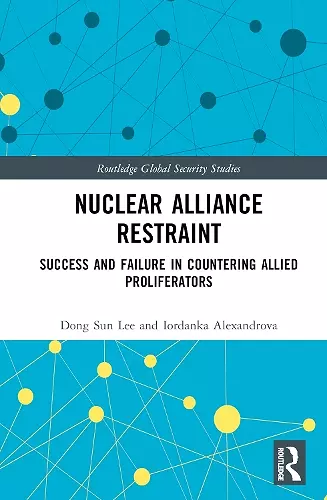Nuclear Alliance Restraint
Success and Failure in Countering Allied Proliferators
Dong Sun Lee author Iordanka Alexandrova author
Format:Hardback
Publisher:Taylor & Francis Ltd
Published:5th Feb '25
£145.00
Supplier delay - available to order, but may take longer than usual.

This book examines why powerful states have varying success in restraining less-powerful allies from acquiring nuclear weapons, based on a broad range of historical case studies.
The outcomes of nuclear alliance restraint primarily depend on two structural factors: the number of superpowers in the global system and the geographical distance between patrons and clients. Through in-depth case studies of South Korea, North Korea, China, and Pakistan and a comprehensive analysis of 14 historical episodes, the book demonstrates that restraint succeeds when there are two superpowers, with one trying to rein in a distant ally. Conversely, restraint often fails with a single superpower in the system or when nuclear aspirants are close to their patrons. This study has important implications for current nonproliferation efforts since it suggests that a bipolar world with the United States and China as superpowers would enhance counterproliferation effectiveness, reducing nuclear proliferation risks. In addition, an inducement-centered approach adopted early on would be most effective for these superpowers in restraining their allied proliferators.
This book will be of much interest to students of nuclear proliferation, foreign policy, security studies, and international relations.
'Nuclear Alliance Restraint is a fascinating and well-researched book that explains when powerful states are likely to prevent their weaker allies from acquiring nuclear weapons. Whereas many experts fear increased nuclear proliferation now that unipolarity has ended and great-power competition is back with a vengeance, Lee and Alexandrova argue the opposite. Let’s hope they are right!'
John J. Mearsheimer, R. Wendell Harrison Distinguished Service Professor of Political Science at the University of Chicago, USA
'Nuclear Alliance Restraint adopts a bold approach to understanding a crucially important question—under what conditions do powerful states fail to stop weaker allies from acquiring nuclear weapons? The authors develop a structural theory that focuses on polarity—the number of superpowers—and geography. Their high-level theory provides a parsimonious, yet nuanced, understanding of the credibility and leverage of the major power’s carrots and sticks, and produces crucial insights that are missing from theories that focus instead on the characteristics of individual states. Nuclear Alliance Restraint greatly advances our understanding of nuclear proliferation, as well as the dynamics of asymmetric alliances.'
Charles L. Glaser, Senior Fellow in the MIT Security Studies Program and Professor Emeritus of Political Science and International Affairs at George Washington University, USA
ISBN: 9781032914015
Dimensions: unknown
Weight: 526g
184 pages